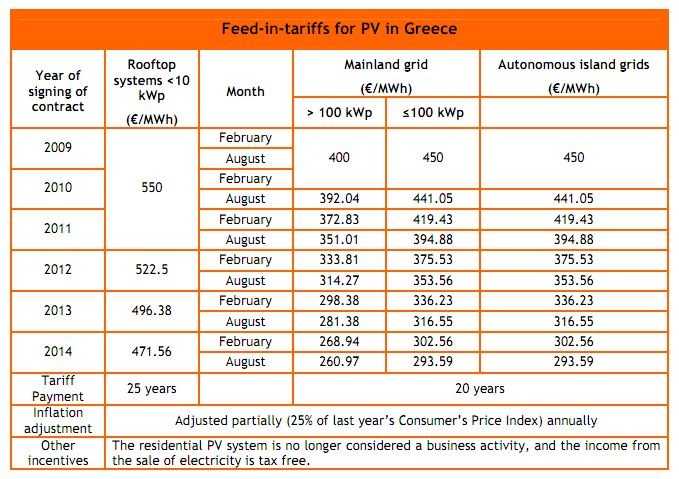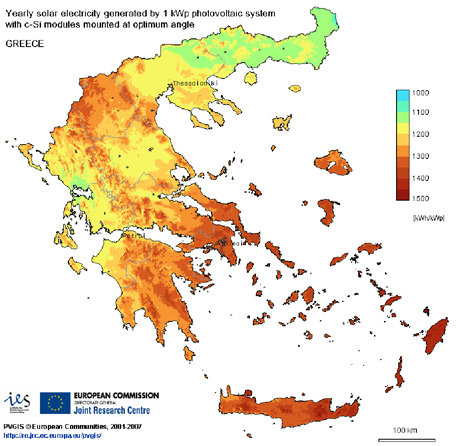Projects
Investment projects
Legislative framework:
Which country has the best incentives for the installation of residential photovoltaic (PV) systems? If your
answer is Germany, the leading country worldwide in renewable energy, then you are wrong! Surprisingly
enough, the best regime is in Greece.
Amidst an unprecedented financial crisis, the Greek government has taken bold initiatives for the
development of residential solar systems, offering not just generous financial incentives but also
simplifying the authorisation procedures as well. Any citizen, who wants to install a solar system with a
capacity of up to 10 kilowatts (kWp) on their roof, can do so easily, simply by visiting the local electricity
company office.
A second positive surprise comes from the banking sector. Practically every bank in Greece now offers up
to 100% financing for the installation of residential PV systems. No wonder then why thousands of people
applied for such systems.
The situation was not as easy some time ago, and it is still not a piece of cake when it comes to bigger
commercial PV systems.
The first Greek legislation for PV was introduced in 2006 offering generous feed-in-tariffs (a premium for
selling green electricity to the grid) and setting the details for authorisation of PV systems. These
authorisation processes were however complicated and certain procedures were long-lasting or even
unnecessary. As a result, and despite the good financial incentives, the Greek PV market developed very
slowly in the last years, and thousands of applications have piled up, mainly due to the legal-
administrative barriers imposed.
The Greek PV sector has been very active in trying to convince the relevant decision makers that a much
simpler and effective framework is needed in order to develop a healthy and robust market.
New renewable energy legislation (Law 3851/2010) was passed by the Greek Parliament in mid-2010
bringing important changes in the legal-administrative framework. Furthermore, there were some new
Ministerial Decisions which have lifted certain bureaucratic barriers.
More specifically:
• New applications for large PV systems can now be filed to the Regulatory Authority for Energy
(such applications were previously frozen).
• Production (electricity generation) license is not needed for systems <1 MWp.
• Rooftop systems of any size do not require environmental permitting any more, while procedures
have become easier for ground-mounted systems.
• Residential systems can now be installed in all regions (previous regulations excluded the
autonomous island grids).
• Applications previously excluded (such as facades, louvers, warehouses, carports, etc) are now
feasible in the residential sector.
• PV systems on historical buildings can now be deployed under a special authorisation procedure.
• Installation of PV systems on prime agricultural land is now allowed with certain limitations.
• A 150 €/kWp bank guarantee is needed for ground-mounted systems up to 1 MWp before the
signing of a grid connection contract.
As a result of these positive developments, thousands of potential investors have expressed interest in PV.
This has led to a grid bottleneck as it is practically impossible to facilitate the connection of all these
systems at once. It will therefore take some time before many of these projects can take off.
In 2010, despite the deep financial crisis, the Greek PV market nearly quadrupled compared to the
previous year. New installations reached 150 MWp in 2010 and are expected to be twice as much in 2011.
PV is probably the only sector which shows strong development trends in Greece. This development has
created thousand of new jobs. Some 4,250 full time jobs have been created in the last four years in the
manufacturing and installation of PV systems. Six manufacturing plants are now operating in the country
and hundreds of companies are offering their services in trading, procuring and installing photovoltaics. In
the meantime, the Greek government has set a target of 2,200 MWp by 2020, a target which, although the
second best in Europe on a percentage basis, seems rather conservative when considering the current
boom.

Incentives for PV


Greek Sunlight:

|